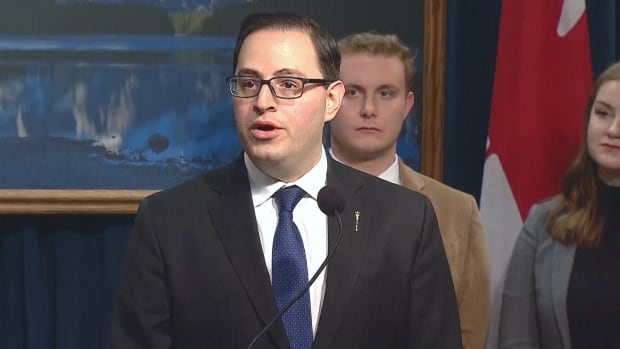Alberta’s advanced education minister says new steps to “strengthen free speech” on post-secondary campuses will be announced in the near future, news that follows a decision by one university to reverse course on a planned speech by a controversial academic.
The University of Lethbridge said this week that former Mount Royal University professor Frances Widdowson, who’d been scheduled to do a lecture Wednesday night on campus, would not be provided space. She had been fired from MRU in 2021.
Widdowson made headlines in 2020 for comments she made suggesting there had been an educational benefit to residential schools.
Alberta Advanced Education Minister Demetrios Nicolaides said he learned of the U of L’s decision on Monday.
“I understand past comments made by this speaker are controversial, but I believe it is important for our universities and colleges to foster a strong culture of free speech and diverse viewpoints, even when those viewpoints are deemed controversial, or even offensive, barring speech intended to incite hatred or violence of course,” Nicolaides said in a statement provided to CBC News.
“I will be announcing new steps to strengthen free speech on Alberta’s post-secondary campuses in the near future. It should be for students, not university administrators, to make the final decision about whether to listen to a speech or not.”
Nicolaides added that his comments should not be construed as agreement with any past comments made by Widdowson.
Notley calls minister’s position ‘troubling’
Opposition NDP Leader Rachel Notley said Tuesday she was troubled by the position taken by the minister.
“As far as I’m concerned, the idea of of having someone come and speak at the university, particularly in Lethbridge, to a student body that consists of many Indigenous students about how they somehow benefited from residential schools, is deeply troubling to me,” Notley said during a media availability. “That is deeply hurtful communication.”
Notley said she believed it would be an exception to free speech principles.
“That the UCP doesn’t understand how incredibly hurtful those ideas are to huge swaths of the Alberta population reveals their lack of understanding about the real experiences and traumas that treaty people have been subjected to over centuries,” she said.
Changes come in addition to ‘Chicago principles’
Sam Blackett, a spokesperson for the minister, said these new changes will likely be announced in the next week or two.
Alberta has already adopted the University of Chicago Statement on Principles of Free Expression, also known as the “Chicago principles,” which states that universities must promote freedom of debate and protect it from potential restrictions.
“Although members of the University community are free to criticize and contest the views expressed on campus, and to criticize and contest speakers who are invited to express their views on campus, they may not obstruct or otherwise interfere with the freedom of others to express views they reject or even loathe,” according to the Chicago principles.
Under former Alberta Premier Jason Kenney, all 26 publicly funded post-secondary institutions were instructed to either endorse the principles, which were initially released in 2014, or develop a separate policy consistent with them.
All institutions complied by the deadline of Dec. 15, 2019.
The principles have gone on to be adopted by dozens of universities in the United States, and have also been adopted in Ontario. Some critics, however, have suggested the principles come with various imperfections.
“The Chicago principles’ main shortcoming is in the false assurance they offer the colleges and universities who endorse them,” University of Pennsylvania political science and education professor Sigal Ben-Porath wrote in 2018.
“They rely on a legalistic and formal framework that purports to offer a response to a set of problems that has little use for such blunt tools.”
University’s decision a reversal
The U of L’s decision was a reversal of its previous position, released Thursday, suggesting that though the university did not agree with Widdowson, it would allow the lecture to proceed in line with its policy on free expression.
Widdowson had been invited by a U of L faculty member to deliver a lecture called, “How ‘Woke-ism’ Threatens Academic Freedom.’
But by Monday, following days of pushback from students and faculty — and two petitions that had received more than 2,500 signatures demanding the speech be cancelled — the university changed course, with Mahon stating that “considerable feedback” had been received internally and externally.

Widdowson made headlines in 2020 after saying the Black Lives Matter movement had destroyed Mount Royal University and that there had been an educational benefit to residential schools, prompting more than 6,000 people to call for her firing via a petition.
She has frequently suggested that she has been punished for criticizing “woke ideas,” and that the open exchange of ideas is under threat in universities today.
Widdowson, meanwhile, says she still plans to show up and give her talk at the university on Wednesday, adding that security at the university would have to “forcibly haul” her away to stop her.
A U of L spokesperson said Tuesday that university officials have seen her intentions on social media “to engage members of the university community in an impromptu manner.”
“As always is the case, the University will initiate approaches that thoughtfully mitigate disruption and prioritize the safety and security of our campus community,” the spokesperson said in a statement.


